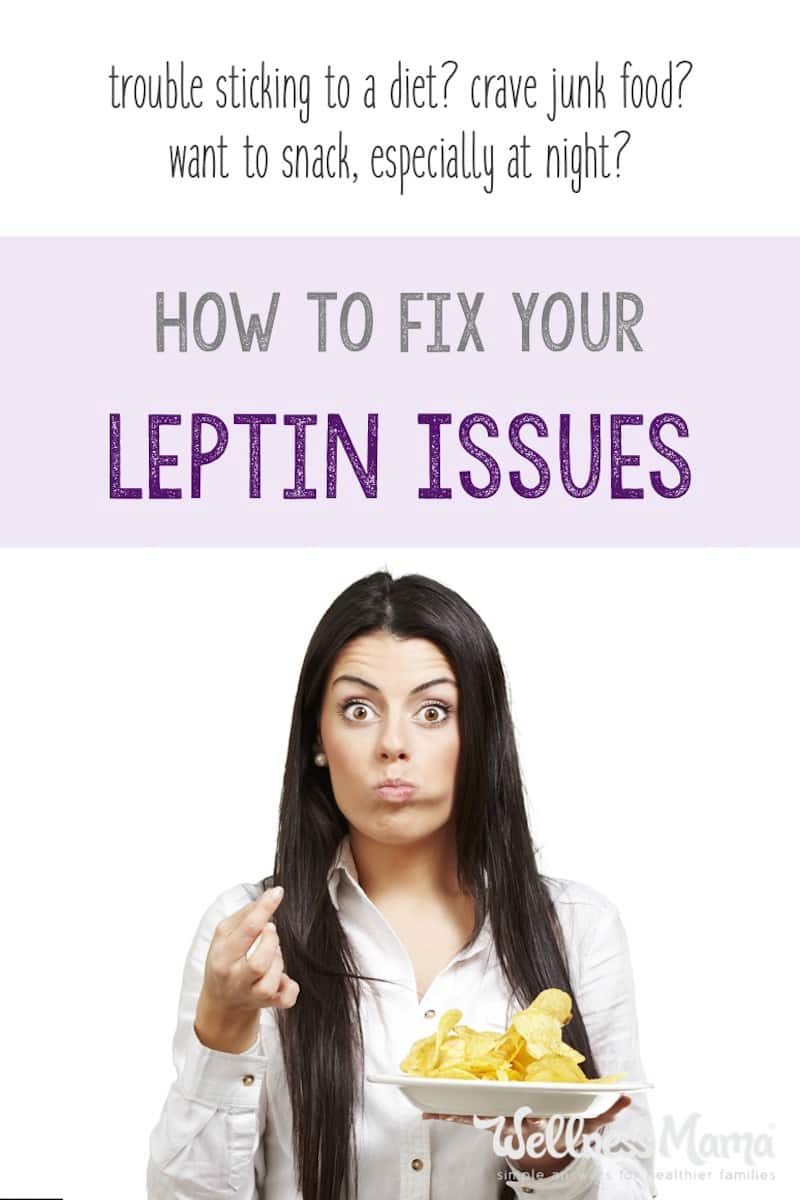Do you struggle with weight and have trouble sticking to a diet? Crave (junk) foods, especially at night? Eat and never feel full?
A little something called leptin resistance may be to blame!
These are all indications that you could have some leptin issues. Leptin is a master hormone in the body that controls hunger and feelings of satiety. Leptin is secreted by adipose (fat) tissue, so the more overweight a person is, typically, the higher his or her leptin levels.
The Culprit: Leptin Resistance
According to Mark’s Daily Apple:
Leptin is the lookout hormone – the gatekeeper of fat metabolism, monitoring how much energy an organism takes in. It surveys and maintains the energy balance in the body, and it regulates hunger via three pathways:
- By counteracting the effects of neuropeptide Y, a potent feeding stimulant secreted by the hypothalamus and certain gut cells
- By counteracting the effects of anandamide, another feeding stimulant
- By promoting the production of a-MSH, an appetite suppressant
It is also directly tied to insulin levels. Many people these days are leptin resistant and there are many health problems tied to this problem. High leptin levels have been tied to high blood pressure, obesity, heart disease and stroke, as well as blood sugar related problems.
High levels of leptin and the accompanying leptin resistance can also decrease fertility, age you more quickly and contribute to obesity. If you’re trying to lose weight or improve a health problem, chances are you have leptin resistance. If you can’t seem to stick to health changes, chances are you have leptin resistance.
In other words, if you want to make lasting health changes or lose weight and keep it off, you have to fix your leptin. The good news is: if you’ve failed at diets or health changes in the past, it was likely because you failed to regulate your leptin levels and doing so can help you finally make lasting changes.
Leptin resistance and its related problems are a complex problem involving the endocrine system and reversing them requires more than simple calorie restriction or will power.
Leptin Stimulating Foods and Lifestyle Factors
As with all hormone issues, leptin resistance is a complex issue with no singular cause, but there are many factors that can negatively impact leptin levels including:
- Fructose consumption (especially in forms like high fructose corn syrup)
- High stress levels
- Consumption of a lot of simple carbs
- Lack of sleep
- High insulin levels (vicious cycle here)
- Overeating
- Exercising too much, especially if your hormones are already damaged
- Grain and lectin consumption
Leptin is the satiety hormone produced by fat cells, so it would seem logical that those with more fat cells would produce more leptin, which would signal the body to eat less food and weight would normalize. This over-simplified idea is great in theory but doesn’t always occur, especially in those with damaged metabolisms or endocrine problems (which includes most overweight people).
According to this article:
The problem is not in the production of leptin, but rather, studies show that the majority of overweight individuals who are having difficulty losing weight have a leptin resistance, where the leptin is unable to produce its normal effects to stimulate weight loss. This leptin resistance is sensed as starvation, so multiple mechanisms are activated to increase fat stores, rather than burn excess fat stores. Leptin resistance also stimulates the formation of reverse T3, which blocks the effects of thyroid hormone on metabolism (discussed below).
So, the person is eating excess food but the body thinks it is starving and tells the person to eat more. It’s easy to see how this cycle could contribute to weight gain!
How to Fix Leptin Resistance
As I said, this is a complex problem, but not an irreversible one. The good news is you feel better quickly once it’s under control.
In short, the (non-negotiable) factors that will help improve leptin response are:
- Say no to sugar. Eat little to no simple starches, refined foods, sugars, and fructose. Eat quality carbs from veggies instead.
- Get enough protein and fat. Consuming a large amount of protein and healthy fats first thing in the morning, as soon after waking as possible. This promotes satiety and gives the body the building blocks to make hormones. My go-to is a large scramble with 2-3 eggs, vegetables and left over meat from the night before cooked in coconut oil.
- Get regular sleep. This step may be more important than all the rest combined. (Yes, really!) Be in bed by 10 (no excuses) and optimize your sleep!
- Spend time in nature. Get outside during the day, preferably barefoot on the ground, in mid-day sun with some skin exposed. Here’s why.
- DON’T SNACK!!! When you are constantly eating, even small amounts, during the day it keeps your liver working and doesn’t give hormones a break. Try to space meals at least 4 hours apart and don’t eat for at least 4 hours before bed. This includes drinks with calories but herbal teas, water, coffee or tea without cream or sugar are fine. For creative ways to do this even as a busy mom, see this post.
- Don’t workout at first. If you are really leptin resistant, this will just be an additional stress on the body. Let your body heal a little first, then add in the exercise.
- Change how you exercise. When you do exercise, do only sprints and weight lifting. Walk or swim if you want to but don’t do cardio just for the sake of cardio. It’s just a stress on the body. High intensity workouts and weight lifting, on the other hand, give the hormone benefits of working out without the stress from excess cardio and are great after the first few weeks. Also, work out in the evening, not the morning, to support hormone levels.
- Detox. Remove toxins from your life as these are a stress on your body. Get rid of processed foods, commercial deodorants (make your own instead), and switch to natural cleaning products. How? I wrote a whole book on the topic with an easy-to-follow detox lifestyle plan and recipes.
- Increase omega-3, lower omega-6. Eat (or take) more omega-3s by eating fish, grass-fed meats, or chia seeds) and minimize your omega-6 consumption (vegetable oils, conventional meats, grains, etc,) to get lower inflammation and help support healthy leptin levels.
How the Leptin Hormone Works
If you want to know more, here’s a great video that explains more about the leptin hormone cascade and how it impacts your health. Also check out the additional resources at the end of the post.
Additional Reading
Dr. Jack Kruse (a neurosurgeon) and Stephan Guyenet (an obesity researcher) have both written in depth about the causes of leptin imbalance and ways to reverse it. I highly recommend these resources for more information on their methods of correcting leptin resistance:
- Changing the Body’s Setpoint
- Factors That Affect Leptin
- Dr. Kruse’s Leptin Prescription
- The book Mastering Leptin also has a much more in-depth explanation and suggestions
Do you have any of these issues? Think leptin is a struggle for you? Try this and let me know how it goes!



Leave a Reply